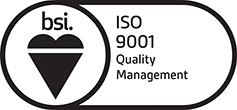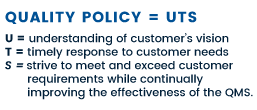Manufacturing organizations rely on suppliers to deliver quality products on time while keeping costs in check. However, suppliers may struggle to meet customer expectations when they lack process maturity, proper contract review, information exchanges or proper sub-tier contract requirement flow down.
Supplier performance directly affects the quality of the whole supply chain making it essential to establish an efficient mechanism to enhance it, accelerate its improvement and ensure the quality of services and products.
If you are looking to improve your organization’s efficiency and lower supply chain risk, strengthening your supplier performance management program offers a good place to start. At Unitek Technical Services a Kiwa Company, we work with your business teams to define best practices for supplier performance management services that could help you build long-term strategic partnerships and get more value from your suppliers.
What Is Supplier Performance Management?
Supplier performance management (SPM) is a business practice that is used to measure, analyze, and manage the performance of a supplier. Supply Chain management professionals seek to cut costs, alleviate risks, and drive continuous improvement. Supplier performance management involves software, systems, processes, and people.
Supplier performance management is a crucial process for organizations with complex supply chains. It involves monitoring key suppliers metrics and giving feedback with quantitative data to the supplier for actionable improvement. Supplier performance management is more than simply obtaining data on suppliers. It reflects the company’s supply chain strategy and is a comprehensive approach to managing a company’s supply base. It seeks to identify and mitigate risks in an attempt to boost overall profitability. It often involves performance assessments, supplier scorecards, periodic reviews of supplier data, and supplier development tools.
The Benefits of Strong Supplier Performance
By providing detailed reporting and support to suppliers throughout the supply chain, supplier performance management makes it easier for suppliers to meet your organization’s requirements. Some other supplier performance management benefits include:
- Supplier Visibility: Supplier performance management enables the organizations to have increased transparency into how the supplier is performing and helps identify areas of improvement.
- Decreased risk: Supplier performance management helps reduce the risk of supply chain disruption.
- Increased efficiency: Supplier performance management increases the understanding of customer requirements. It helps direct the focus of the supplier to provide quality products on time. Improved product quality reduces rework, scrap and waste in both time and material.
- Planning potential: Increased communication through supplier performance management also allows customers to plan ahead. Data collected on supplier delivery performance help Supply Chain leadership make better informed decisions on production capability.
- Contract review/ renewals: Knowing the past performance of a supplier helps Quality and Supply Chain managers determine the true cost of product acquisition beyond the bid price. It also helps the decision process on which suppliers are high performing and capable of your production needs.
Supplier Performance Management Best Practices
Cultivating strong, mutually beneficial relationships with suppliers requires your organization to shift its approach to procurement. To make the most of the supplier performance management process, it is important to:
- Define a process for collecting, analyzing and managing the supplier performance. It is essential that your supplier evaluation practices serve your specific business interests.
- Know which KPI’s are important to your organization: Quality/DPPM, On-Time Delivery, Quantity Ordered vs. Quantity received, etc.
- Create a score card for monthly KPI tracking and Define the evaluation process.
- Consistently communicate the results with the suppliers.
- Communicate the results internally. Stack rank the suppliers, Determine if there are consistent areas that suppliers are struggling. Review if internal processes can be improved to eliminate the supplier issues. Develop a strategy for which suppliers are addressed first for improvement activities.
- Actively pursue supply chain risk mitigation and supplier development.
Improve Your Supplier Performance Management with Unitek
When you collaborate with your suppliers and involve them in the process of deciding how to achieve the relevant requirements, you build long-lasting, trust based relations that can be leverage in the future. Collaborating with suppliers makes them more willing to understand and partner for your business needs.
Supplier performance management is an essential part of any procurement strategy, but performing the analytics, communications and improvement strategies with suppliers around the world can take time and resources away from your organization’s core activities. At Unitek, we can handle supplier performance management on your behalf, allowing you to focus on other critical tasks.
With over 45 years of experience, we are uniquely positioned to help OEMs in technical industries plan and implement supplier performance management practices. For more information about our services, reach out to us today.




